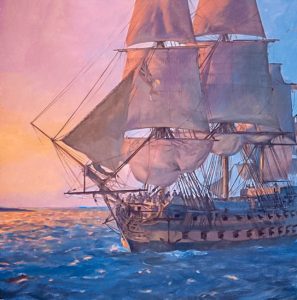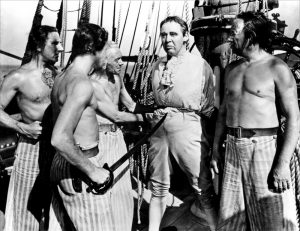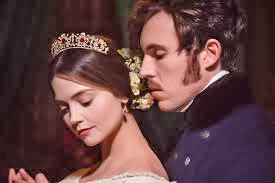Tarzan Of The Apes


by Edgar Rice Burroughs

Episode Three

Chapter 1: Out to Sea, continued


 The two sailors picked themselves up off of the deck, the older man helping his wounded comrade to stand. The big fellow, Black Michael, tried his leg gingerly, and finding that he could put enough weight on it, he turned to Clayton with a word of gruff thanks. Though the fellow’s tone was surly, his words were evidently well-meant. Before he had barely finished his little speech, he had turned, and he was limping off to go belowdecks, with the very apparent intention of avoiding any further conversation with anyone.
The two sailors picked themselves up off of the deck, the older man helping his wounded comrade to stand. The big fellow, Black Michael, tried his leg gingerly, and finding that he could put enough weight on it, he turned to Clayton with a word of gruff thanks. Though the fellow’s tone was surly, his words were evidently well-meant. Before he had barely finished his little speech, he had turned, and he was limping off to go belowdecks, with the very apparent intention of avoiding any further conversation with anyone. 


 Lord John and Lady Alice didn’t see Black Michael again for several days. And the Captain didn’t offer them more than the surliest of grunts, himself, when he was forced to speak to them. The couple continued to have their meals in his cabin, as they had done before the unfortunate occurrence. But the Captain was careful to see that his duties never permitted him to eat with them at the same time.
Lord John and Lady Alice didn’t see Black Michael again for several days. And the Captain didn’t offer them more than the surliest of grunts, himself, when he was forced to speak to them. The couple continued to have their meals in his cabin, as they had done before the unfortunate occurrence. But the Captain was careful to see that his duties never permitted him to eat with them at the same time. 

 The other Officers were coarse, illiterate men themselves, very little above the villainous crew that they bullied. They, as well, were only too glad to avoid social interaction with the polished English noble and his lady, so the Claytons were now left very much to themselves. This, in itself, accorded perfectly with their wishes, but it also rather isolated them from the life of the little ship. They were basically unable to keep in touch with the daily happenings, which were to culminate so soon in bloody tragedy.
The other Officers were coarse, illiterate men themselves, very little above the villainous crew that they bullied. They, as well, were only too glad to avoid social interaction with the polished English noble and his lady, so the Claytons were now left very much to themselves. This, in itself, accorded perfectly with their wishes, but it also rather isolated them from the life of the little ship. They were basically unable to keep in touch with the daily happenings, which were to culminate so soon in bloody tragedy. 
| multiple: Blended |
| listen: Blended | ||||||||

|
||||||||
| listen: Blended | ||||||||||

|
||||||||||
| listen: Blended | ||||||||||||||

|
||||||||||||||
| listen: Blended | ||||||||||||||

|
||||||||||||||
| listen: Blended | ||||||||||

|
||||||||||
| look: Blended | |||||||

|
|||||||
| look: Blended | |||||||||

|
|||||||||
| look: Blended | |||||||||||||

|
|||||||||||||
| look: Blended | |||||||||||||

|
|||||||||||||
| look: Blended | |||||||||

|
|||||||||

 There was an undefinable but tangible tension on the craft now, suggesting that some kind of disaster was imminent. Outwardly, to the knowledge of the Claytons, all of the ship’s usual activities went on, just as before, aboard the little vessel. But there was the subtle sense of a sinister undertow, leading them toward some unknown danger. They both felt it, but they didn’t talk to each other about it.
There was an undefinable but tangible tension on the craft now, suggesting that some kind of disaster was imminent. Outwardly, to the knowledge of the Claytons, all of the ship’s usual activities went on, just as before, aboard the little vessel. But there was the subtle sense of a sinister undertow, leading them toward some unknown danger. They both felt it, but they didn’t talk to each other about it. 

 On the second day after the wounding of Black Michael, Clayton happened to come on deck. He arrived just in time to see the limp body of one of the crew being carried below by four of his shipmates. He noticed that the First Mate had a heavy belaying pin in his hand, and he stood glowering at the small party of sullen sailors. Clayton asked no questions. It was obvious that yet another crewman had been beaten. So the following day, as the great lines of a British battleship grew out of the distant horizon, he half determined to demand that he and Lady Alice be transferred to that naval vessel. His fears were steadily increasing that nothing but harm could come from remaining on the sullen, threatening Faulkner.
On the second day after the wounding of Black Michael, Clayton happened to come on deck. He arrived just in time to see the limp body of one of the crew being carried below by four of his shipmates. He noticed that the First Mate had a heavy belaying pin in his hand, and he stood glowering at the small party of sullen sailors. Clayton asked no questions. It was obvious that yet another crewman had been beaten. So the following day, as the great lines of a British battleship grew out of the distant horizon, he half determined to demand that he and Lady Alice be transferred to that naval vessel. His fears were steadily increasing that nothing but harm could come from remaining on the sullen, threatening Faulkner. 
| multiple: Stretch |
| listen: Stretch | ||||||

|
||||||
| listen: Stretch | ||||||||||

|
||||||||||
| listen: Stretch | ||||||||

|
||||||||
| listen: Stretch | ||||||||||||||||||

|
||||||||||||||||||
| look: Stretch | |||||

|
|||||
| look: Stretch | |||||||||

|
|||||||||
| look: Stretch | |||||||

|
|||||||
| look: Stretch | |||||||||||||||||

|
|||||||||||||||||

 Toward noon, they were within speaking distance of the British ship. But when Clayton had nearly decided to ask the Captain to put them aboard her, the obvious ridiculousness of such a request became suddenly apparent to him. What reason could he give the Officer commanding Her Majesty’s ship for wanting to head back in the direction from where he had just come! What if he told them that two insubordinate seamen had been roughly handled by their Officers? They would just laugh at him, and assume that his reason for wanting to leave the Faulkner was because he was nothing but a coward.
Toward noon, they were within speaking distance of the British ship. But when Clayton had nearly decided to ask the Captain to put them aboard her, the obvious ridiculousness of such a request became suddenly apparent to him. What reason could he give the Officer commanding Her Majesty’s ship for wanting to head back in the direction from where he had just come! What if he told them that two insubordinate seamen had been roughly handled by their Officers? They would just laugh at him, and assume that his reason for wanting to leave the Faulkner was because he was nothing but a coward. 


 So John Clayton, Lord Greystoke, did not, after all, ask to be transferred to the British man-of-war. Late in the afternoon, he saw her upper works fade below the far horizon, but not before he learned of something that confirmed his greatest fears. He now cursed the false pride that had kept him from moving his young wife to the battleship. Just a few short hours before, safety had been within their reach. But now it was gone, forever.
So John Clayton, Lord Greystoke, did not, after all, ask to be transferred to the British man-of-war. Late in the afternoon, he saw her upper works fade below the far horizon, but not before he learned of something that confirmed his greatest fears. He now cursed the false pride that had kept him from moving his young wife to the battleship. Just a few short hours before, safety had been within their reach. But now it was gone, forever. 

 It was mid-afternoon that brought the little old sailor, who had been knocked down by the Captain a few days before, to where Clayton and his wife were standing by the ship’s side, watching the outlines of the great battleship gradually disappear from sight. The old fellow was polishing brasses, and as he came edging along, finally up close to Clayton, he said in an undertone, “‘Ell’s to pay, sir, on this ‘ere craft, an’ mark my word for it, sir. ‘Ell’s to pay.”
It was mid-afternoon that brought the little old sailor, who had been knocked down by the Captain a few days before, to where Clayton and his wife were standing by the ship’s side, watching the outlines of the great battleship gradually disappear from sight. The old fellow was polishing brasses, and as he came edging along, finally up close to Clayton, he said in an undertone, “‘Ell’s to pay, sir, on this ‘ere craft, an’ mark my word for it, sir. ‘Ell’s to pay.” 

 “What do you mean, my good fellow?” asked Clayton.
“What do you mean, my good fellow?” asked Clayton. 
 “Wy, hasn’t ye seen wats goin’ on? Hasn’t ye ‘eard that devil’s spawn of a Capting an’ is Mates knockin’ the bloomin’ lights outen ‘arf the crew? Two busted ‘eads yeste’day, an’ three to-day. Black Michael’s as good as new agin, an’ ‘e’s not the bully to stand fer it, not ‘e; an’ mark my word for it, sir.”
“Wy, hasn’t ye seen wats goin’ on? Hasn’t ye ‘eard that devil’s spawn of a Capting an’ is Mates knockin’ the bloomin’ lights outen ‘arf the crew? Two busted ‘eads yeste’day, an’ three to-day. Black Michael’s as good as new agin, an’ ‘e’s not the bully to stand fer it, not ‘e; an’ mark my word for it, sir.” 
 “You mean, my man, that the crew is thinking about mutiny?” asked Clayton.
“You mean, my man, that the crew is thinking about mutiny?” asked Clayton. 
 “Mutiny?!” exclaimed the old fellow. “Not just mutiny! Way worse, sir. They means murder, an’ mark my word for it.”
“Mutiny?!” exclaimed the old fellow. “Not just mutiny! Way worse, sir. They means murder, an’ mark my word for it.” 
 “When?”
“When?” 


 “Hit’s comin’, sir. Hit’s comin’. But I’m not a-sayin’ wen. An’ I’ve said too damned much now, but ye was a good sort t’other day, an’ I thought it no more’n right to warn ye. But keep a still tongue in yer ‘ead, an’ when ye ‘ear shootin’, git below an’ stay there. That’s all, only keep a still tongue in yer ‘ead, or they’ll put a pill between yer ribs, an’ mark my word for it, sir.” At this point, the old fellow went on with his polishing, which carried him away from where the Claytons were standing.
“Hit’s comin’, sir. Hit’s comin’. But I’m not a-sayin’ wen. An’ I’ve said too damned much now, but ye was a good sort t’other day, an’ I thought it no more’n right to warn ye. But keep a still tongue in yer ‘ead, an’ when ye ‘ear shootin’, git below an’ stay there. That’s all, only keep a still tongue in yer ‘ead, or they’ll put a pill between yer ribs, an’ mark my word for it, sir.” At this point, the old fellow went on with his polishing, which carried him away from where the Claytons were standing. 

 “Devilishly cheerful outlook, that old crewman has, Alice,” said Clayton.
“Devilishly cheerful outlook, that old crewman has, Alice,” said Clayton. 
 “You should warn the Captain at once, John. Possibly the trouble may yet be averted,” she said.
“You should warn the Captain at once, John. Possibly the trouble may yet be averted,” she said. 
 “I probably should, but because of purely selfish motives, I am almost tempted to ‘keep a still tongue in my ‘ead.’ Whatever they do now, they will spare you and me, recognizing that I stood up for this fellow Black Michael. But should they find that I have betrayed them, there would be no mercy given to us, Alice.”
“I probably should, but because of purely selfish motives, I am almost tempted to ‘keep a still tongue in my ‘ead.’ Whatever they do now, they will spare you and me, recognizing that I stood up for this fellow Black Michael. But should they find that I have betrayed them, there would be no mercy given to us, Alice.” 

 “You have just one duty here, John. You absolutely must support the command authority of the Captain. If you don’t warn him, you’re as much a guilty party to whatever bad events occur, just as though you had helped them to plot and carry it out with your own head and hands.”
“You have just one duty here, John. You absolutely must support the command authority of the Captain. If you don’t warn him, you’re as much a guilty party to whatever bad events occur, just as though you had helped them to plot and carry it out with your own head and hands.” 


 “You don’t understand, dear,” replied Clayton. “I am thinking all about you. My first duty is to you. The Captain has gotten himself into this delicate position with his crew, so why should I risk subjecting my wife to unthinkable horrors, in a probably futile attempt to save him from his own brutal folly? You have no conception, dear, of what would happen if this pack of cutthroats gained control of the Faulkner.”
“You don’t understand, dear,” replied Clayton. “I am thinking all about you. My first duty is to you. The Captain has gotten himself into this delicate position with his crew, so why should I risk subjecting my wife to unthinkable horrors, in a probably futile attempt to save him from his own brutal folly? You have no conception, dear, of what would happen if this pack of cutthroats gained control of the Faulkner.” 
 “Duty is duty, John, and not even a well-constructed, false rationalization will change that. I would be a pitiful example of a good wife for an English lord, if I was responsible for having him shirk an obvious moral duty. I realize that it will put us in grave danger, but I can face it, with you.”
“Duty is duty, John, and not even a well-constructed, false rationalization will change that. I would be a pitiful example of a good wife for an English lord, if I was responsible for having him shirk an obvious moral duty. I realize that it will put us in grave danger, but I can face it, with you.” 
1. John Clayton thought about:
a) taking over as captain of the ship
b) appointing another crew member to be captain
c) transferring to a British man-of-war.
2. He changed his mind because:
a) he was afraid others would think he was a coward
b) he did not know anything about sailing a ship
c) the British man-of-war did not have room for any more passengers.
3. Clayton thought there was going to be trouble on the ship because:
a) he saw crew members getting beaten up
b) everyone was getting seasick
c) he was warned by a crew member
d) both a and b
e) both a and c
4. John did not want to tell the captain about this because:
a) he was afraid that something terrible would happen to his wife
b) he was afraid of the captain
c) he didn’t think there was anything he could do about it.
5. Lady Alice told John Clayton:
a) they should hide in their stateroom until they got to their destination
b) that he should tell the captain what was going on with the crew
c) that they should both keep their mouths shut.
Chapter One to be continued in Episode Four. 




















